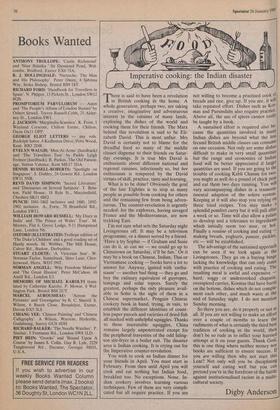Vollos
000"I'v A-7o /46,\
Imperative cooking: the Indian disaster
'There is said to have been a revolution in British cooking in the home. A whole generation, perhaps two, are taking a creative, imaginative and adventurous 'interest in the cuisines of many lands, exploring the dishes of the world and cooking them for their friends. The Marx behind this revolution is said to be Eli- zabeth David. This is most unfair. Mrs David is certainly not to blame for the dreadful food so many of the middle classes dispense to their friends on Satur- day evenings. It is true Mrs David is enthusiastic about different national and regional cuisines, infectiously so, but her enthusiasm is tempered by the David virtues of skill, practice, taste and learning.
What is to be done? Obviously the goal of the late Eighties is to stop as many people as possible from cooking for others and the remaining few from being adven- turous. The counter-revolution is urgently needed: for the explorers, having savaged France and the Mediterranean, are now trekking East.
I'm not sure what sets the Saturday night Livingstones off. It may be a television programme, or a dinner served by a friend. `Have a try Sophie — if Graham and Susie can do it, so can we — we could go up to Chinatown on Saturday, it'll be fun.' Or it may be a book on Chinese, Indian, Thai or Vietnamese cooking — books have a lot to answer for. Anyway, ignited with `enthu- siasm' — another bad thing — they go and buy the culinary equivalent of guyropes, tentpegs and solar topees. Surely the greatest, perhaps the only pleasure avail- able in Soho is the sight of them in a Chinese supermarket, Penguin Chinese cookery book in hand, trying, in vain, to establish the different identities of count- less paper parcels and varieties of dried fish all marked with unhelpful squiggles. Thanks to these inscrutable squiggles, China remains largely unpenetrated except for the peripheral travesties of the odd Isling- ton stir-fryer in a boiler suit. The disaster area is Indian cooking. It is crying out for the Imperative counter-revolution.
You wish to cook an Indian dinner for your friends in April. You must start in February. From then until April you will cook and eat nothing but Indian food, breakfast too. No exceptions. None. In- dian cookery involves learning various techniques. Few of them are very compli- cated but all require practice. If you are not willing to become a practised cook of breads and rice, give up. If you are, it will take repeated effort. Dishes such as K01 mas and Pursindahs also require practice• Above all, the use of spices cannot easilY be taught by a book. A sustained effort is required also be- cause the quantities involved in manY Indian dishes are beyond what the less fecund British middle classes can consume on one occasion. Not only are some dishes difficult to make in very small quantities but the range and economics of Indian food will be better appreciated if larger quantities are used. If you are going to the trouble of cooking Kabli Channe for two, you might as well do a pound of chick peas and eat them two days running. You will vary accompanying dishes in a transcon- tinental adaption of the solera system• Keeping at it will also stop you relying 00 three tried recipes. You may make a splendid pomfret curry but it will pall after a week or so. Time will also allow a palate to develop and a tolerance to ingredients which initially seem too sour, or hot. Finally a routine of cooking and eating making breads, yoghurts, paneer, pickles, etc — will be established.
The advantage of the sustained approach can be seen if we look again at the Livingstones. They go on a buying binge lacking the knowledge that can only conic with practice of cooking and eating. The resulting meal is awful and expensive -- hard, soggy or undercooked chapatis, overspiced curries, Kormas that have burnt on the bottom, dishes which do not comple- ment each other, and much waste at the end of Saturday night. I do not mention Sunday morning. So there you are, do it properly or not at all. If you are not willing to make an effort over a couple of months to learn the rudiments of what is certainly the third best tradition of cooking in the world, then don't be so rude as to inflict your hurried attempt at it on your guests. Thank God, this is one thing where neither money nor books are sufficient to ensure success. If you are willing then why not start this Lent? Not only will you be disciplining yourself and eating well but you can pretend you're in the forefront of the battle against institutionalised racism in a multi- cultural society.
Digby Anderson










































 Previous page
Previous page